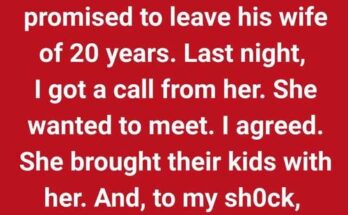There are moments in life when everything shifts in an instant. For me, it happened on an ordinary Saturday afternoon, just as the house filled with the sounds of arriving guests. My fourteen-year-old daughter, Sarah, slid a small folded note across the dining table. Five words were written in her neat handwriting:
Pretend you’re sick and leave.
At first, I didn’t understand. I looked at her, confused, but the urgency in her eyes was unmistakable. She wasn’t joking. She wasn’t exaggerating. She was terrified.
I didn’t realize then that her quiet warning would unravel the truth about my marriage, save our stability, and guide us out of a situation far more harmful than I ever imagined.
What follows is not a story of danger, but rather a story of awakening, courage, and rebuilding. It is about financial betrayal, emotional manipulation, and a young girl’s determination to protect her mother when she sensed something deeply wrong.
And it all began on what should have been a peaceful morning in our suburban Chicago home.
A Morning That Should Have Been Ordinary
Life had seemed comfortable on the surface. Two years earlier, I had married Richard, a polished and successful businessman who came into our lives after my divorce. To friends and neighbors, we looked like a newly blended family finding our rhythm. A secure home. A fresh start. A chance to move forward.
But as any parent knows, children often see what adults overlook. Sarah had always been observant, quiet, thoughtful. While her relationship with her new stepfather looked smooth enough from the outside, something about him kept her on alert.
Richard was hosting several business partners that morning to discuss a new expansion project. I had prepared all week—setting the table perfectly, organizing food, straightening every corner of the house. I wanted everything to go well.
As I arranged the final dishes, Sarah appeared in the doorway. Her complexion was pale, and her eyes held a seriousness that made me pause.
“Mom,” she whispered, “I need to show you something in my room.”
Before I could respond, Richard walked in, adjusting his tie, every bit the polished executive. “What are you two whispering about?” he asked lightly.
I brushed it off. “Just schoolwork.”
But Sarah tugged gently at my sleeve as soon as he left the room. Something was wrong, and she didn’t want to say it aloud.
A Daughter’s Quiet Warning
The moment we reached her room, she shut the door. Then she handed me a small piece of paper, hurriedly folded.
I opened it.
Pretend to be sick and leave. Now.
My heart raced for reasons I couldn’t yet explain. “Sarah, what is this?”
“I’m serious,” she whispered. “Please trust me. You need to get out of here. Just say you’re not feeling well.”
Before I could ask anything else, footsteps approached. Richard appeared, irritated that we hadn’t returned to help greet the early guests.
Something in me, instinctive and ancient—the instinct of a mother—told me to believe my daughter. So I did. I played the part, claiming dizziness and stepping away from the event.
It wasn’t until we reached the car that she finally spoke.
“Mom… something’s wrong with Richard. I overheard him last night. He’s planning something that will hurt you.”
She didn’t describe violence. She didn’t describe anything dramatic. What she described was far more common, far more subtle, and far more dangerous to a family’s stability.
She had overheard Richard discussing hidden financial troubles, debts he had never disclosed, and plans to shift assets—assets we shared—without my knowledge. She had gone into his office afterward and found documents showing secret accounts, unusual transfers, and significant sums missing from what should have been our shared finances.
He had been planning to take full control of our home and resources. And he had crafted a story that would make it appear as though I had left abruptly, irrationally, even emotionally unwell. A story that would protect him if I ever questioned the missing funds.
My daughter had sensed the tension long before I did.
Her note wasn’t about panic. It was about protection.
It was about getting me out of a situation where I was unaware, misled, and gradually being pushed into a corner without realizing it.
And she was right.
The Truth Behind the Perfect Image
When we pulled away from the house, she showed me the photos she had taken:
Financial statements I’d never seen.
Hidden transfers.
Bank accounts in his name only.
Outstanding loans.
Notes that made it clear he intended to use the planned brunch as a turning point—an opportunity to further isolate me and take over the remainder of my resources.
What I had thought were thoughtful suggestions—a new insurance policy, a joint account, letting him manage the finances—had been pieces of a private strategy he had been building quietly.
I felt a wave of shock, betrayal, and disbelief. It was as if the life I had been living for two years suddenly cracked open like thin ice.
Richard wasn’t the partner I believed he was. He was someone who carefully shaped conversations, controlled money slowly, and relied on my trust to make decisions behind my back.
Not physical harm. Not open confrontation. Something quieter but devastating in its own way: financial abuse and manipulation.
And my daughter had caught it.
Protecting Ourselves and Seeking Help
With the evidence in hand, we couldn’t go back home. Richard’s messages intensified, each one written with concern that felt increasingly forced. He knew we had left suddenly, and he was already shaping his narrative.
I called my longtime friend, Francesca, an experienced attorney. She didn’t hesitate.
“Stay where you are. I’m coming to you.”
When two officers later approached us—sent by Richard, who had reported that I’d left in a confused emotional state—Sarah showed them the photos. Francesca arrived just in time to ensure we weren’t pressured into going home.
We went directly to the precinct to give a statement, not against a violent threat, but against financial deception and emotional coercion.
When confronted, Richard portrayed himself as the devoted husband, concerned and bewildered. But the inconsistencies in his explanations became clear quickly, especially as additional financial documents came to light. Transfers he couldn’t explain. Accounts he hadn’t disclosed. Insurance applications he filed without discussing with me. Statements that contradicted one another.
Slowly, the picture came together.
The brunch had been his opportunity to present himself as the successful businessman he claimed to be, even though bankruptcy had been looming. The guests were part of the image he wanted to maintain while covering the financial gaps behind the scenes.
My departure—and Sarah’s involvement—interrupted the plan.
A New Beginning After the Truth
What followed was a long, exhausting legal process, but one that ultimately protected us. The marriage was dissolved. The financial discrepancies were investigated. Misused funds were returned. Any remaining joint accounts were closed.
Within months, Sarah and I moved into a modest but peaceful apartment. Our days were quieter, calmer. We slept better. We laughed more.
One afternoon, while unpacking a stack of books, a small folded note slipped out from between the pages. I recognized the handwriting immediately.
Pretend to be sick and leave.
I sat down, holding that little slip of paper that had changed the course of our lives. Not because of fear—but because of love, courage, and the kind of intuition only a child who pays attention can have.
That note had not saved us from danger—it had saved us from deception, control, and a future built on lies.
It had given us the chance to start over.
Moving Forward with Strength
Today, a year later, our lives feel grounded again. My daughter is flourishing, no longer weighed down by worries she kept hidden. I have rebuilt my independence, regained control of my finances, and rediscovered my confidence.
Sometimes, the most powerful turning points come from the smallest gestures.
Five simple words.
A daughter’s quiet warning.
A second chance at a life built on truth.
And for that, I will forever be grateful.



